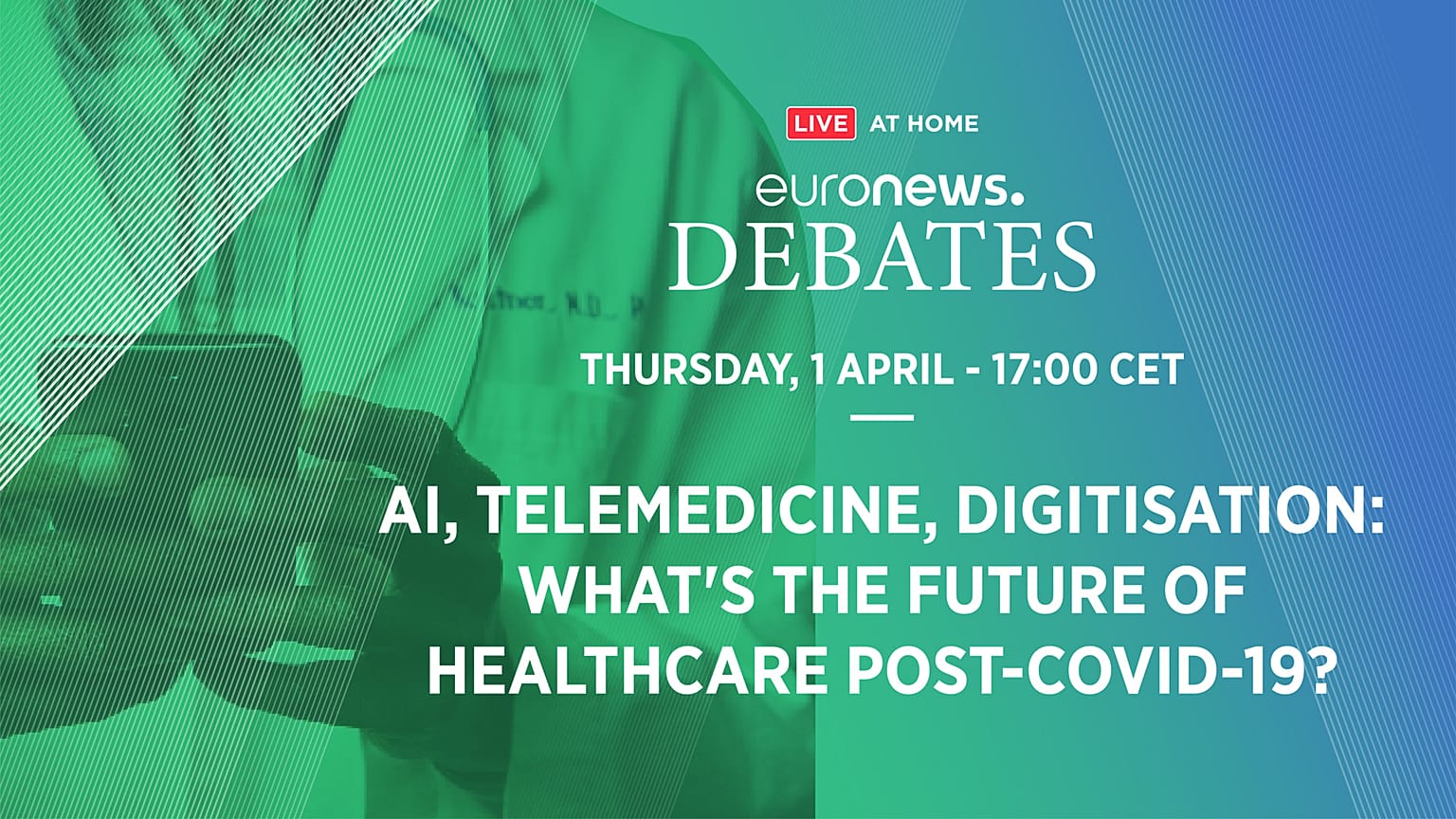What's the future of healthcare? Are you going to become your own doctor? Can AI beat the world's biggest diseases? Are hospitals as we know them going to disappear? What are the breakthrough technologies which will transform medicine in the next decade?
What's the future of healthcare? Are you going to become your own doctor? Can AI beat the world's biggest diseases? Are hospitals as we know them going to disappear? What are the breakthrough technologies which will transform medicine in the next decade?
Euronews put these questions and more to a panel of experts in a live virtual debate. on Thursday, 1 April.
On the panel:
- Dr. Seán Byrne, President of the European Health Parliament, and Brussels-based expert in EU health policy and bioethics.
- Dr. Jamil El-Imad, Senior Research Fellow at Imperial College London, the CEO of TechNovus Ideas Laboratory and the Chief Scientist at Neuropro.
- Dr. Naomi Lee, Senior Executive Editor at The Lancet and Vice-Chair of the ITU-WHO Focus Group on AI for Health.
- Dr. Bertalan Meskó, Director of The Medical Futurist Institute, Private Professor at Semmelweis Medical School
- Jan-Willem Scheijgrond, Vice-President, Government & Public Affairs, Philips
COVID-19, telemedicine and the doctor-patient relationship
From virtual GP appointments to track and trace apps, technology has played a key role in helping healthcare systems respond to the COVID-19 crisis. It has been proven possible for GPs to diagnose and treat patients virtually (telemedicine) and for patients to be more proactive with their own healthcare.
As a result, the pandemic has brought about a cultural transformation; the “doctor-patient relationship has been transforming into an equal partnership,” according to Dr. Bertalan Meskó.
“The role of the passive patient has been shifting to a proactive, empowered patient [and] the role of the physician being the key-holder to the ‘ivory tower of medicine’ has been changing into the role of a guide for patients in the ‘jungle of information’.”
Could hospitals become a thing of the past?
Going to hospital has been the last resort throughout the pandemic to prevent further spread of the virus. This begs the question: are hospitals as we know them going to be a thing of the past? Our panelists envision a future healthcare system where more emphasis is placed on primary care and hospitals will become specialist units, rather than mass treatment centres.
"Health will move to the home like all other services, like shopping and banking and so on,” said Dr. Jamil El-Imad . “It’ll be about prevention, early diagnostics and self-therapy before moving into a hospital setting”.
Despite optimism for a healthcare system which focuses on primary care in future, Dr. Naomi Lee said that in the last decade, hospital specialisation has grown by 30 per cent, while general practice hasn’t grown much at all in comparison. Therefore, there needs to be more investment in the primary care sector.
Can and should patients have access to their own private data?
Unlike online banking and other services available on smartphones, there is currently no centralised system for patients to access all of their health records. This is something the EU is currently working on with the EU Health Information Initiative (EUHII).
“The technology is there. Health records are digitised, but they’re sitting there in different [places],” explains Dr. Seán Byrne, who is one of the experts involved with the EUHII. “So let’s say you go to the dentist and then go to your GP and then you have to see a specialist, they don’t necessarily have access to all of the same records. And that’s a problem.”
The same goes for patients who travel around the EU and need medical attention. As well as establishing a better digital infrastructure for medical records, the EUHII is working towards a system which means a patient’s entire medical record could be accessed anywhere in the EU.
Can AI help us predict the next pandemic?
“I have no doubts that public health officials will need to use some form of AI in the future,” said Dr. Meskó. But “it’s not the miracle cure or the holy grail,” he warned, adding that simpler technologies such as early warning systems are more effective than AI.
While the use of AI in medicine is futuristic, our panelists agreed that AI products are hyped and flawed. When asked whether AI could help us predict the next pandemic, Dr. Lee said, “it wasn’t finding the pandemic or identifying the cases which was difficult, it was getting people to listen.”
How can AI be developed for healthcare?
According to the panel, AI products currently lack quality data to make them effective. Dr. Lee said only 7 per cent of FDA approved AI products actually represent the makeup of the population.
Meanwhile, 93 per cent of healthcare professionals are concerned about bias in AI data according to Dr. Jan-Willem Scheijgrond, who said AI is unhelpful when it’s modeled on a “rich, white, male population.”
Not only is there a lack of diversity in data, there isn’t enough data to support impactful AI models in the health sector. This stems from a lack of trust in patients about sharing their private, personal data.
“The technology has been allowed to digitise healthcare for decades. It’s the societal debate on ethics, security and privacy,” said Dr. El-Imad. “And unless we do that, I think the health sector will never move forward.
“Today many people talk about AI, but they forget that if we don’t have health data records, AI will never find its way meaningfully into the health sector,” he added.
**You can watch the full debate in the video player above. **















